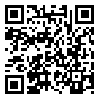Volume 23, Issue 1 (Spring 2022)
jrehab 2022, 23(1): 68-87 |
Back to browse issues page
Download citation:
BibTeX | RIS | EndNote | Medlars | ProCite | Reference Manager | RefWorks
Send citation to:



BibTeX | RIS | EndNote | Medlars | ProCite | Reference Manager | RefWorks
Send citation to:
Sadeghi B, Estebsari F, Ebadi A, Rasouli M, Sadeghi E. The Social Support Needs of Family Caregivers of Patients With Multiple Sclerosis: A Qualitative Study. jrehab 2022; 23 (1) :68-87
URL: http://rehabilitationj.uswr.ac.ir/article-1-2886-en.html
URL: http://rehabilitationj.uswr.ac.ir/article-1-2886-en.html
1- Department of Community Health Nursing, Faculty of Nursing and Midwifery, Shahid Beheshti University of Medical Sciences, Tehran, Iran.
2- Department of Community Health Nursing, Faculty of Nursing and Midwifery, Shahid Beheshti University of Medical Sciences, Tehran, Iran. ,fa_estebsari@yahoo.com
3- Behavioral Sciences Research Center, Life Style Institute, Baqiyatallah University of Medical Sciences, Tehran, Iran.
4- Cancer Research Center, Shahid Beheshti University of Medical Sciences, Tehran, Iran.
5- Department of medical surgical nursing, Faculty of Nursing, Arak University of Medical Sciences, Arak, Iran.
2- Department of Community Health Nursing, Faculty of Nursing and Midwifery, Shahid Beheshti University of Medical Sciences, Tehran, Iran. ,
3- Behavioral Sciences Research Center, Life Style Institute, Baqiyatallah University of Medical Sciences, Tehran, Iran.
4- Cancer Research Center, Shahid Beheshti University of Medical Sciences, Tehran, Iran.
5- Department of medical surgical nursing, Faculty of Nursing, Arak University of Medical Sciences, Arak, Iran.
Abstract: (6321 Views)
Objective: Multiple sclerosis (MS) is one of the most common chronic progressive neurological diseases. It is the non-traumatic cause of neurological disability in adults. This disease increases the patient’s need for care due to the progressive course of disease that intensifies the symptoms over time. Family caregivers of these patients have different challenges and needs for caregiving. The present study aims to investigate the supportive needs of family caregivers of patients with MS in Iran.
Materials & Methods: This is a qualitative study conducted in MS Association of Isfahan, Iran in 2018-2019 for 8 months. Participants were selected by a purposive sampling method who included 8 patients, 13 family caregivers, and 4 treatment staff. Semi-structured interviews were used to survey the supportive needs of caregivers. Interviews took about 30-60 minutes. Sampling and data collection were saturated after 25 interviews. We used Guba and Lincoln’s criteria (credibility, dependability, transferability, and conformability) to evaluate and validate the data. The contract content analysis technique was used to analyze the data.
Results: The results of analysis yielded 795 initial codes. After merging these codes based on common features, 562 codes were remained. The supportive needs of family caregivers of MS patients were presented in three main categories (creating interaction opportunities to reduce isolation, empathetic interaction with peers and treatment staff, and financial support) and nine sub-categories.
Conclusion: Most of the family caregivers of MS patients in Iran do not receive adequate social and systemic supports from health care providers and do not have access to support resources. Policymakers and health caregivers should provide the required supporting programs for these caregivers so that they can optimally play their role in caregiving MS patients, especially at home, while receiving appropriate social and systemic supports.
Materials & Methods: This is a qualitative study conducted in MS Association of Isfahan, Iran in 2018-2019 for 8 months. Participants were selected by a purposive sampling method who included 8 patients, 13 family caregivers, and 4 treatment staff. Semi-structured interviews were used to survey the supportive needs of caregivers. Interviews took about 30-60 minutes. Sampling and data collection were saturated after 25 interviews. We used Guba and Lincoln’s criteria (credibility, dependability, transferability, and conformability) to evaluate and validate the data. The contract content analysis technique was used to analyze the data.
Results: The results of analysis yielded 795 initial codes. After merging these codes based on common features, 562 codes were remained. The supportive needs of family caregivers of MS patients were presented in three main categories (creating interaction opportunities to reduce isolation, empathetic interaction with peers and treatment staff, and financial support) and nine sub-categories.
Conclusion: Most of the family caregivers of MS patients in Iran do not receive adequate social and systemic supports from health care providers and do not have access to support resources. Policymakers and health caregivers should provide the required supporting programs for these caregivers so that they can optimally play their role in caregiving MS patients, especially at home, while receiving appropriate social and systemic supports.
Type of Study: Original |
Subject:
Nursing
Received: 10/03/2021 | Accepted: 9/10/2021 | Published: 1/04/2022
Received: 10/03/2021 | Accepted: 9/10/2021 | Published: 1/04/2022
Send email to the article author
| Rights and permissions | |
 |
This work is licensed under a Creative Commons Attribution-NonCommercial 4.0 International License. |








